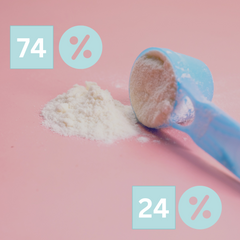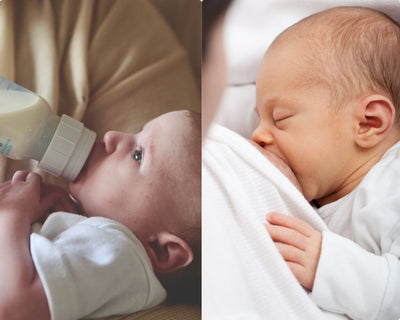What Are the Risks of Not Breastfeeding?
What Are the Risks of Not Breastfeeding?
By Katie Black
The language we use when talking about something often plays as big a role as the actual meaning of what we say. In other words, the way we relay information has a big effect on how the information is received. This is especially true for how breastfeeding and formula are talked about.
When we compare the phrase “benefits of breastfeeding” (which you’ll hear often) with the “risks of not breastfeeding” (less focused on) they mean the same thing, but this tiny difference in wording has a very big effect on a mom choosing to breastfeed.
The review, The Risks of Not Breastfeeding for Mothers and Infants, from the National Library of Medicine says,
“If ‘breast is best,’ then formula is implicitly ‘good’ or ‘normal’”.

Data from a national survey shows that while 74% of US residents disagreed with the statement: “Infant formula is as good as breast milk,” only 24% agreed with the statement: “Feeding a baby formula instead of breast milk increases the chance the baby will get sick” even though these statements are mathematically equal.
So why is focusing on the risks so important? Let’s dive into the extensive list.
1. Infant Physical Health

The first and most immediate risk of not breastfeeding is that your baby misses out on colostrum. This is milk filled with nutrients that comes in the first few days after giving birth. Colostrum has antibodies, antioxidants and other substances that help protect the baby from infections and diseases, and it’s very important in those vital first days when their immune systems are being made.
Without breast milk, there’s a 30-200% increase in the chance of developing a chronic disease. There’s also an association with an uptick in infectious morbidity, including otitis media, gastroenteritis, and pneumonia, as well as higher risks of childhood obesity, type 1 and type 2 diabetes, leukemia, and SIDS.
One study found that babies who were not breastfed faced more risk of hospitalization for respiratory tract infection in the first year of life which was 3.6 times higher than infants who were exclusively breastfed for more than 4 months.
Babies who are formula fed have a higher risk of gastroenteritis and diarrhea. In fact, one meta-analysis of 14 studies discovered that infants who were either formula fed or fed a mix of formula and breast milk were 2.8 times more likely to get a gastrointestinal infection than those who were exclusively breastfed.
Children who are formula fed in infancy are also more likely to become obese or develop type 2 diabetes. In meta-analyses they were 1.1 to 1.3 times as likely to become obese as children who had never been breastfed.
Necrotizing enterocolitis (NEC) is a serious disease that mostly affects premature babies—not being breastfed is associated with a 2.4-fold risk of NEC for preterm babies.
Studies also suggest that formula feeding is associated with a 1.6 to 2.1 fold increased odds of SIDS compared with breastfeeding. These associations stayed even after adjusting for sleeping position, maternal smoking, and socioeconomic status.
2. Infant Neurodevelopment

Not breastfeeding has also shown to worsen cognitive development, leading to lower IQs and worse academic performance than breastfed babies.
Among babies who were normal weight at birth, those who were fed formula (even complimentary) before 6 months were less likely to be walking at 12 months. And at six and a half years old, their verbal IQ scores were 7.5 points lower compared to kids exclusively breastfed.
3. Maternal Risk

In addition to the risks to the baby, not breastfeeding can pose risks for mothers too. For one, breastfeeding releases hormones that may help with emotional wellbeing, maybe even leading to a lower risk of postpartum depression and anxiety.

A meta-analysis of 47 studies found that not breastfeeding was associated with a 4.3% increase in risk of breast cancer. In another study, the association was higher for mothers who had an immediate family member with breast cancer. In this group, never having breastfed was associated with an increase by 2.4 times in chances of getting breast cancer before menopause, compared with someone who breastfed at some point in their life.
As for ovarian cancers, these studies found that women who had never breastfed faced a 1.5-fold risk, compared with women who breastfed for greater than 18 months.
Moms who breastfeed have different metabolisms than those who use formula, and these differences seem to stay even later in life. In the Nurses’ Health Studies, the risk of type 2 diabetes within the 15 years since their last birth was 1.7-fold higher among women who never breastfed compared with those who breastfed for a total of 2 years or more.
Plus, never breastfeeding is linked with 1.3 times higher risk of having a heart attack compared with those who breastfed for a total of 2 years or more.
4. Financial risk

Money is also something to think about when it comes to choosing how you feed your baby. Although it’s harder to work and breastfeed at the same time, between buying formula, possibly paying for more medical bills, and maybe even earning less from worse cognitive development when drinking formula, the financial risks add up.
The Cost of Not Breastfeeding tool was created to help campaigners teach people about and encourage breastfeeding. Here you can find the annual costs of not breastfeeding for a number of countries.
For the United States alone, poor breastfeeding rates lead to over $28 million spent on healthcare every year. For cognitive losses, the tool estimates (if GDP is growing at 3%) a loss of almost $115 billion.
Globally, between cognitive loss and healthcare costs there’s an estimated $340 billion in economic losses every year.
Let's Sum It Up
We’re not trying to scare parents or caregivers, but we do want you to be aware of the stats when it comes to infant nutrition. A lot of formula companies want you to think they’re equivalent to breast milk, but the fact is that’s simply not true.
Formula is a necessary tool we need access to for infant health. At the end of the day, what parents feed their babies hinges on a lot of factors unique to their needs. For some that looks like formula feeding, for others it's exclusively breastfeeding. We want to help you make your decision knowing all the facts.
At Lactation Lab, we want to empower moms to breastfeed with confidence, knowing that their breast milk is enough. We offer a range of tests that can tell you exactly what’s in your milk and if there are any ways you can improve it through simple diet changes. Order your test here.
Related reading: A Powerful Tool in the Campaign for Breastfeeding
Sources:
https://www.ncbi.nlm.nih.gov/pmc/articles/PMC2812877/
https://jamanetwork.com/journals/jamapediatrics/article-abstract/481276
https://pubmed.ncbi.nlm.nih.gov/18458209/
https://pubmed.ncbi.nlm.nih.gov/17450440/
https://jamanetwork.com/journals/jama/article-abstract/201923
https://pubmed.ncbi.nlm.nih.gov/19110223/
https://www.aliveandthrive.org/en/country-stat/usa






